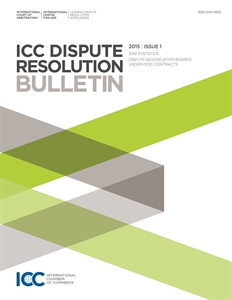Construction and engineering disputes, as shown in the 2014 statistics also in this issue, represent almost a quarter of all cases referred the International Court of Arbitration, so there is much to share. While touching on important questions relating to dispute boards, the admissibility of claims and FIDIC dispute resolution conditions, the awards also offer lessons in matters of contract law and dispute resolution procedure that go beyond the confines of construction contracts.
International construction contracts typically provide for a multi-tiered dispute resolution process in which contested claims, i.e. disputes, are referred to a dispute board prior to arbitration. Such is the procedure adopted in FIDIC’s principal conditions of contract, which are recognized as a standard and are widely used in the international construction industry. This bulletin discusses the many issues relating to Dispute Adjudication Boards (generally known as DABs) that have been raised in several recent ICC arbitrations initiated pursuant to international construction contracts predominately based on FIDIC conditions. These issues cover (1) the claims procedure and the dispute resolution clause, including the requirement to submit claims to the Engineer, the time-bar under Sub-Clause 20.1 of the FIDIC conditions, the statute of limitations relating to claims, and the law applicable to the dispute resolution clause; (2) the DAB procedure, including whether it is always mandatory and a prerequisite to arbitration, whether the DAB has been validly constituted, and the consequences of not referring a dispute to the DAB; and (3) post-DAB issues such as the validity, timeliness and impact of a notice of dissatisfaction and the enforceability of a DAB decision by an arbitral award. The author, Christopher R. Seppälä, draws on his wide and long-standing experience in the field to analyse and assess the importance of the decisions reached on these and other relevant issues in the newly published awards.







